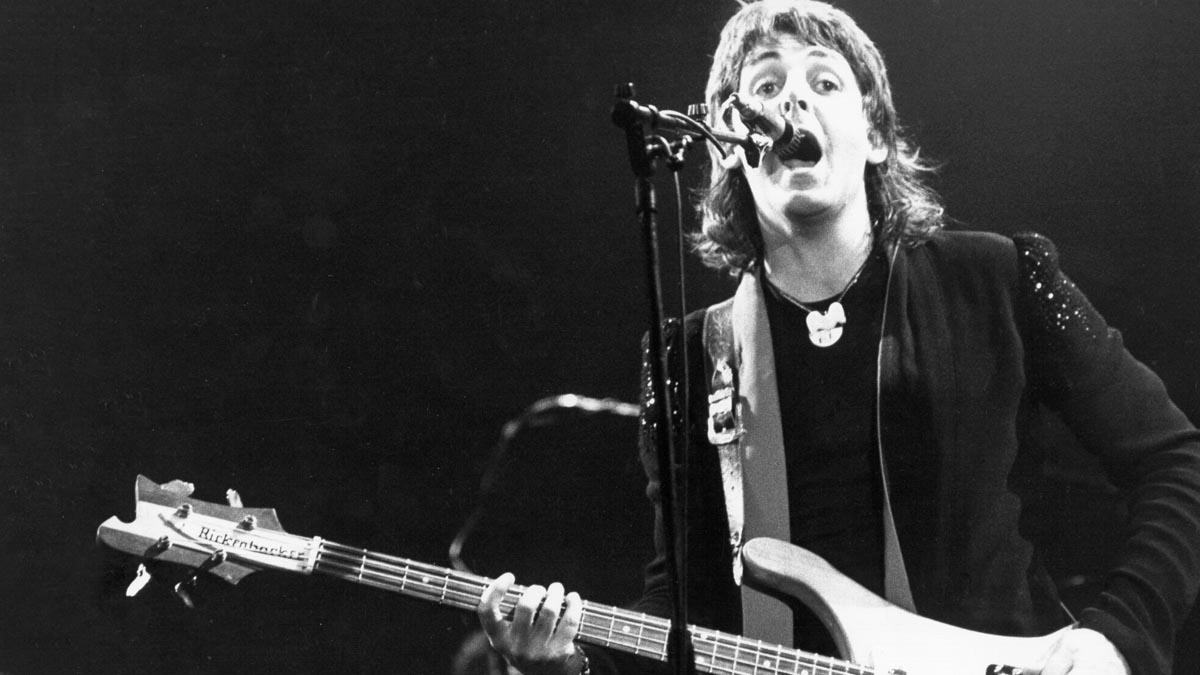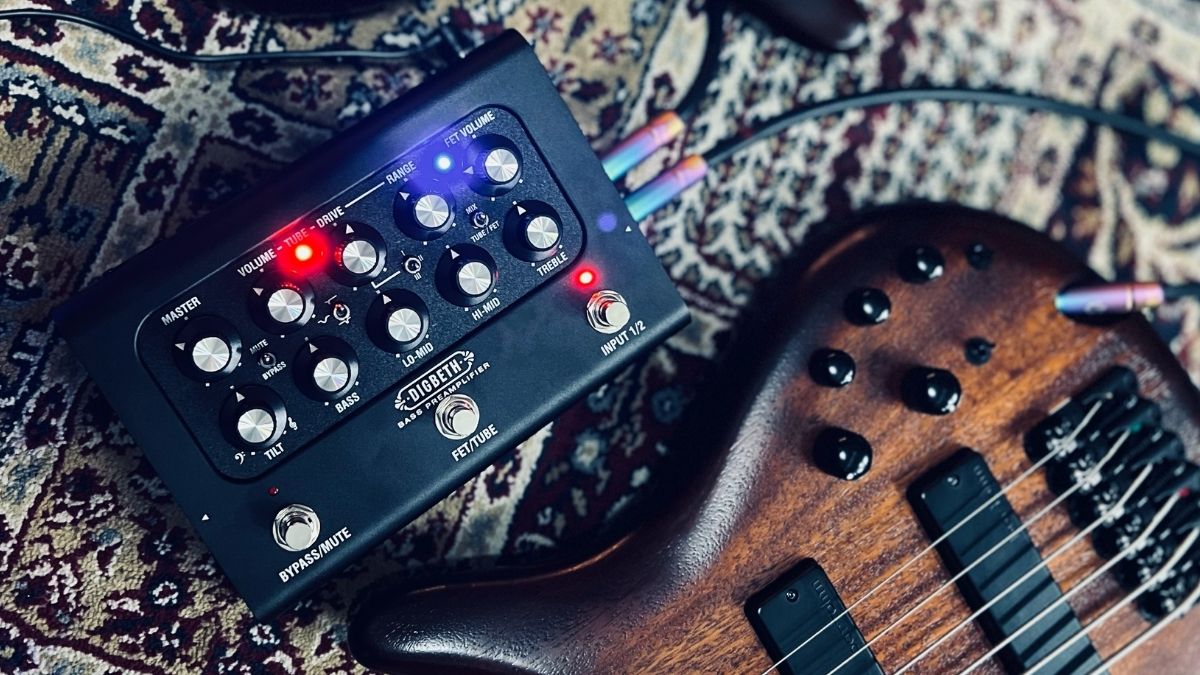Paul McCartney: "Anything Wings did had to be viewed in the light of The Beatles. And the comparisons were always very harsh"
In this classic interview from 1994, McCartney looks back on the transition to Wings, its effect on his bass playing, and how he became an entertainer again

In 1994, Paul McCartney discussed his bass playing in Wings with the writer Tony Bacon. The conversation found McCartney reflecting on Wings' success – somehow it was never enough at the time, but looking back, they did all right.
This was a pivotal moment for the former Beatle. Things were changing. But as he explains, there was never going to be a move from the bass guitar, even if he had switched up his brand of choice....
You were always seen on stage with a Hofner bass with The Beatles, and yet you virtually always used a Rickenbacker while on stage with Wings. Why was that?
“I’m not sure. Maybe it was a combination of things. I knew I was known for the violin shape. It’s like Charlie Chaplin, you know? The little walking cane, the moustache, and a bowler hat, and he’s Charlie. If he comes on with a bandanna and he’s shaved and he’s on a bike, it’s like, ‘Who’s that?’ So I think there may have been an element of that was what I looked like, kind of a trademark.
“Also it was very light and I’d always played it live, so I might have been playing safe a bit, just using the instrument I’d always used. Later I became more used to the Ricky, and with Wings I started to play with that on stage.“
I thought it seemed like it was a conscious thing as far as live work was concerned: Beatles is all about Hofner, Wings is all about Rickenbacker.
“Well yes, changing bands gives you a freedom, obviously.“
All the latest guitar news, interviews, lessons, reviews, deals and more, direct to your inbox!
In Wings you had the choice to hire who you liked, but you chose to stay as the bass player.
“I always approach a tour by thinking as if I’m not there. Well, this geezer McCartney’s going on tour, what would I like to see him do? Well, I’d like to see him play bass – he’s good on that old bass. So I’d think, I must play bass. The man in the audience, the girl in the audience, would expect me to play bass. I’d probably want him to do Yesterday, so we’ll sling that in somewhere.
“Early Wings I didn’t, I’d had enough of that, but now I would do it because I think it goes down well. I’m an entertainer, guys, and if it goes down well, that’s it. I’m the opposite of Bob Dylan. I know G.E. Smith, who played with him, and he told me they’d say, ‘Oh, Bob, Tambourine Man went down great tonight, fantastic’. And that meant [Dylan] wouldn’t do it. He’d knock it out the next night.
“A perverse thing, I don’t know. To me I’m... less complex than that. If it went down well, I leave it in. But with Wings, yeah, I’d feel that I didn’t have to play the Hofner any more, because that was The Beatles and it sort of ended with that period. I don’t know if I was thinking that deeply in Wings.“
Were Wings underrated?
“Yeah, they are, completely, yeah. Number one, The Beatles was the best band in the world. It’s difficult to follow that. It’s like following God. Very difficult, unless you’re Buddha. Anything Wings did had to be viewed in the light of The Beatles. And the comparisons were always very harsh. Denny Laine wasn’t John Lennon. Henry McCullough wasn’t George Harrison. That was inevitable. The interesting thing is that, looking back on some of the work, some of the stuff, it’s better than you think it was, but because it got such harsh criticism... from me.
“The critics gave us a hard run, but I was particularly hard on us. I remember looking at a book, there was an album we did, I think it was Back to the Egg, which didn’t do well, and I remember thinking, ‘God, complete disaster.’ Years later, I remember looking at it with Bowie in this old book – one of these ‘who-did-what’ Hit Parade books, looking it up – and it was like number eight in America. And I thought, most people would give their right bloody arms to be number eight.
“But eight, and I wasn’t satisfied. The Beatles had been number one. This is all right, keeps you going. But yes, a lot of the stuff is underrated, because of that. The truth of the matter is that I had The Beatles and then had another bite of the cherry through Wings, and a lot of what we did, because the industry was growing, we would eventually outsell The Beatles in a number of cases...
“So, you know, there’s a lot to be said for the period after The Beatles, really, and it was a longer time – which was strange when I realized that Wings had been going as long as The Beatles had.“
How do you view that Wings period for you as a bass player?
“I think it was okay, but I think I never quite had the interest that I had during that sort of dream period around Sgt. Pepper and Rubber Soul, when I was doing something... See, with Wings, I was now the band leader, the business manager, the this, the that. We didn’t have Apple, we didn’t have Epstein, we didn’t have anything. It was me doing it all. That was the biggest headache – that’s difficult.
“In The Beatles, I’d been free of all of that. We had a manager, we had three other great guys... I think there was like a prize period when I was playing my best bass, and I think after that I had so much to do that I wasn’t free to just do the bass. I could concentrate everything on writing the song, singing harmony with John, or playing the bass, pretty much my role, or maybe playing a bit of piano or guitar or something.
“Other than that I really didn’t have much to do, so you could put all your energy into that. And I think after that I sidelined the role of bass, a bit, in favor of the role of frontman. It was not really my favorite thing to do, but there was really nothing else to do. The only alternative was to give up music, that I saw.“

